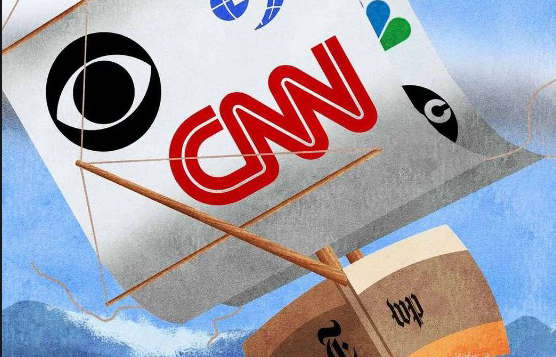
OPINION:
There used to be a saying in media relations that you didn’t pick a fight with someone who bought ink by the barrel. It meant you couldn’t — or shouldn’t — fight the news media because they were too powerful to oppose. As proved by this week’s announcement from Gannett, the nation’s largest publisher of newspapers, that simply isn’t true anymore, and there are good reasons why.
Gannett, which operates its flagship USA Today and over 200 local daily newspapers, shocked the media establishment with a blunt assessment of its financial standing on Wednesday. The company abruptly announced a hiring freeze, a mandatory five-day unpaid vacation, a six-month sabbatical, a stoppage of 401(k) matches by the company for employees, an optional four-day workweek, and voluntary separation packages for those interested in retiring.
Gannett’s CEO made no secret of the fact that the moves were motivated entirely by financial concerns — the company is sinking, and these actions were designed to keep it afloat. Only two months ago, Gannett already laid off 400, or 3%, of its workers in the U.S.
And the news giant isn’t alone.
Earlier this year, CNN endured the embarrassing spectacle of the cancellation of their much-heralded streaming service, CNN+, which closed its doors only a month after its launch. Despite some high-profile hires, fewer than 10,000 subscribers were using the service every day.
Inside CNN, more layoffs have followed and there has been a reshuffling of the on-air talent – not related to the departure of star host Chris Cuomo, who left after a highly publicized scandal that also involved his disgraced brother, former New York Gov. Andrew Cuomo. CNN’s new leadership is actively trying to correct the network’s leftward tilt and dismal ratings.
Nationwide, newsroom staffing has dropped 26% since 2008, according to the Pew Research Center.
What is happening?
For one, the media landscape is more crowded than ever. Web-based news organizations are growing, according to the same Pew study, and the proliferation of cable and Internet outlets has given viewers an almost endless list of places to get their news. Podcasters such as Joe Rogan, Tim Pool, Ben Shapiro and others are drawing in viewers and listeners by the millions.
But when you look at polls about public attitudes toward the legacy media, there is ample proof that the corporate news media has had a hand in doing themselves in. According to Gallup, only 16% of American adults say they have “a great deal” of trust in newspapers, and only 11% have faith in television news. Both numbers are all-time lows.
The polling does show that, while the numbers are still low, Democrats are far more likely to trust the news media than Republicans, and why would that be?
Because Americans aren’t stupid, they can see that most “mainstream” news coverage is slanted toward the political left, and it’s not difficult to discern. Recent years have provided mountains of evidence that the corporate media deck is stacked against conservatives.
It’s been that way for decades, but the Trump era brought it into sharper focus than ever.
The media picked up the “Russia collusion” hoax invented by Hillary Clinton’s campaign and hounded the administration over it for more than two years. They clearly took sides during the COVID-19 outbreak, elevated Dr. Anthony Fauci to living saint status, and publicly shamed anyone who strayed from pandemic orthodoxy. Republican guests on cable talk shows — myself included — were shouted at and accused of being public menaces because they dared question the prevailing beliefs of the media and political establishments. If you correctly pinpointed China as the source of the virus, you risked being called a racist.
The media collectively shut down coverage of Hunter Biden’s laptop, which contained information that implicated his father, now-President Biden, in shady moneymaking schemes with foreign business executives. And they rallied to Mr. Biden’s cause throughout the 2020 presidential election campaign to protect him from his obvious shortcomings, which he concealed by hiding in his basement for much of the campaign.
The social media giants haven’t performed any better, with their naked efforts to quash stories that are either pushed by conservatives or are harmful to the left. Twitter’s ongoing war on conservative viewpoints may culminate in the enigmatic electric car mogul Elon Musk purchasing the company, a development that will be largely seen as a step toward more free speech on the platform. And earlier this month, it was reported that Meta Platforms, Facebook’s parent company, is cutting 12,000 workers, or 15% of its employees.
More competition is a good thing because it gives consumers more choices and allows outlets providing the best content to thrive. If more people are moving away from legacy media, it’s because they’re rejecting what they think is a biased and untrustworthy product.
* Article from: The Washington Times